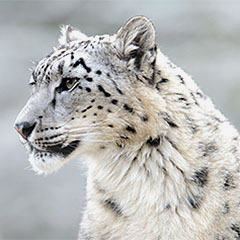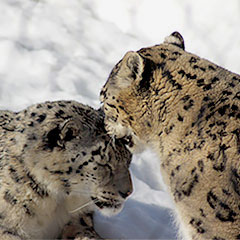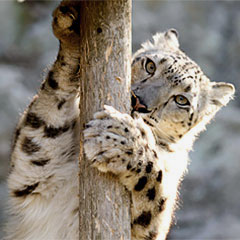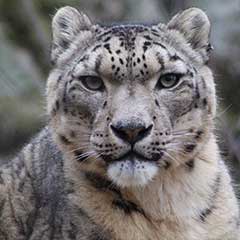
Snow Leopards
Snow Leopard Conservation
Zoo New England is a Conservation Partner with the Snow Leopard Trust, working together to protect this flagship species from extinction.

Snow Leopards
Zoo New England is a Conservation Partner with the Snow Leopard Trust, working together to protect this flagship species from extinction.
Researchers estimate that there are only between 4,000 and 8,000 snow leopards left in the wild. These apex predators inhabit the mountains of Central Asia, where they're perfectly adapted to thriving in harsh conditions. Despite their remote habitat, snow leopards face multiple threats in the form of poachers seeking their fur and bones, a decline in their prey, human encroachment on their habitat, retribution killings by herders looking to protect their livestock, and mining activity in the mountains involving dangerous chemicals and explosives.
The Snow Leopard Trust (SLT) is the oldest and largest organization working to better understand leopard behavior and habitat. The Trust is active in all seven provinces in Mongolia, which is home to the second largest snow leopard population in the world. SLT collaborates with those who live and work near snow leopard habitats to create a better balance between conservation and community needs, and seeks resources to sustain long-term conservation programs.
In this conservation partnership, Zoo New England and SLT work together to implement Mongolia’s Global Snow Leopard and Ecosystem Protection Program strategy through improved collaboration with herder communities in South Gobi, Mongolia.
This project directly benefits herder families, particularly women and children in rural Mongolia, through additional income and educational opportunities. SLT’s handicrafts program has been shown to increase women's sense of well-being, empowerment, and decision-making for the environment. Conservation Contracts, livestock insurance and predator-proof corrals are additional program initiatives that help alleviate farmers’ conflict with snow leopards and increase social acceptance. The project also directly involves local government and wildlife managers (rangers) through collaborative surveys, information-sharing and long-term planning and monitoring.
➤ Visit Stone Zoo to learn more about snow leopards and support our conservation efforts.





